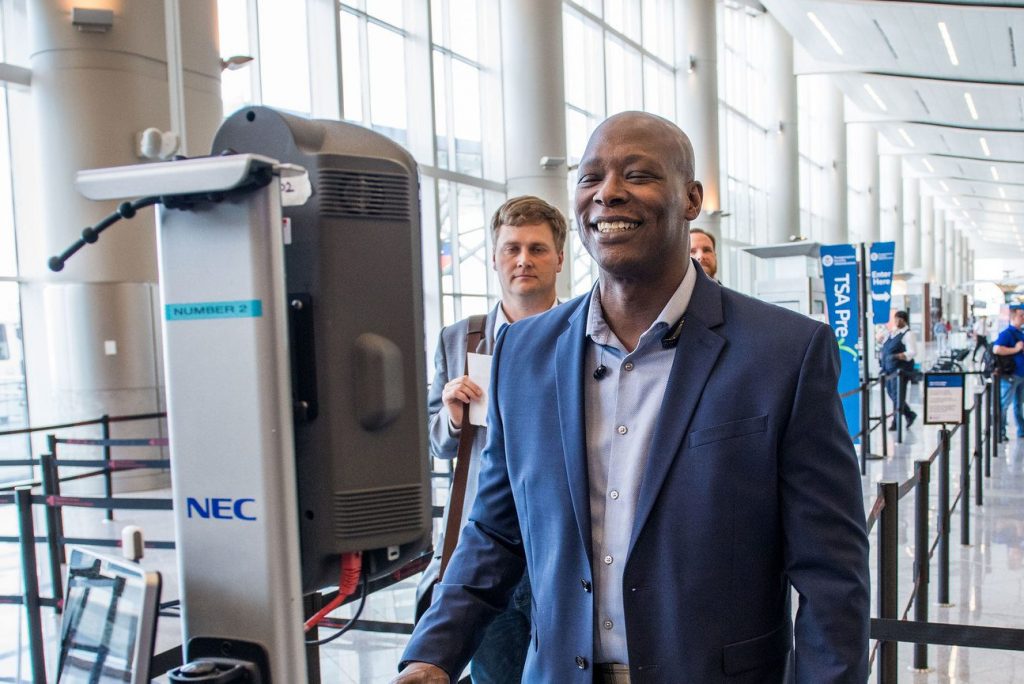
Skift Take
Over a dozen lawmakers have vocalized opposition to the adoption of facial recognization technology at U.S. airports.
A group of U.S. Senators on Thursday pushed to restrict the use of facial recognition at airports – an effort that comes as more than 80 U.S. airports use the biometric technology with plans for expansion to more than 400.
“This technology poses significant threats to our privacy and civil liberties, and Congress should prohibit TSA’s development and deployment of facial recognition tools until rigorous congressional oversight occurs,” said the letter to Senate leadership.
The Senators – Republicans and Democrats – want to add restrictions to the bill to authorize funding for the FAA, which is currently being debated in Congress.
TSA says the technology enhances security and improves traveler convenience.
Some American airlines have partnered with TSA to use biometric data to make it easier for travelers to move through airports. Delta partnered with TSA to develop a digital ID program that allows travelers to use their biometrics to get through bag drop, screening and check-in without a physical ID.
Senators Warn of Surveillance Risks
The senators warn of a slippery slope. Once Americans become comfortable with government facial-recognition scans at airports, the government could expand surveillance – say, tracking entry into public property like parks, the letter said.
The group of lawmakers also argued that biometric technology doesn’t make air travel safer. Lawmakers said TSA doesn’t have evidence that it has caught more travelers using fake IDs thanks to their facial recognition technology.
U.S. Travel Calls on Industry Action
The U.S. Travel Association, an industry trade group, favors the expansion of facial recognition and wants to block changes to the FAA bill that slow it down.
Banning biometric air traveler screening tech would:
🕒 Increase checkpoint wait times
❌ Block TSA PreCheck & Touchless ID solutions
🔓 Lower security
🗑️ Waste millions of taxpayer dollarsAct NOW to preserve TSA PreCheck & lower security wait times!https://t.co/U34arxgAmW
— U.S. Travel (@USTravel) April 30, 2024
In an email blast earlier this week to its Travel Action Network, U.S. Travel called on its newsletter subscribers to voice their opposition to a potential amendment by Senators Jeff Merkley (D-OR) and John Kennedy (R-LA).
“We’ve had thousands of letters that have gone up to the Hill,” Tori Barnes, executive vice president of public affairs and policy for the U.S. Travel Association, told Skift on Wednesday.
“We do see this as a very dangerous bill that would undermine aviation security, delay millions of flyers, and set TSA passenger screening back decades,” said Barnes. “Frankly, biometrics is the future of air travel screening.”
Merkley rejected U.S. Travel’s claims that the loss of facial recognition would lead to longer wait times. In a post on X, Merkley cited TSA’s own research on the issue.
“While Americans are generally supportive of allowing biometric use for a more seamless and smooth
air travel process, about half of all Americans are uncomfortable sharing their biometric data with both
the government and private corporations,” a survey by the U.S. Travel Association found.
But among recent air travelers, the share that are comfortable with biometric data with both the government and private corporations exceed 60%, U.S. Travel found.
U.S. Travel’s Push for More Biometrics at Airport
Biometric adoption is part of U.S. Travel’s overall push to make air travel more seamless and smooth. At Skift Global Forum in September, U.S. Travel Association CEO and President Geoff Freeman said getting through TSA screening lines at airports is a bottleneck to growing travel.
The lack of biometric security screening adoption at most American airports has put the U.S. at a competitive disadvantage with other destinations, according to research by the trade group.
About 60% of airports plan to install biometrics through their facilities in the next five years, including check-in and boarding, according to a global survey by Amadeus, a travel IT tech firm.

